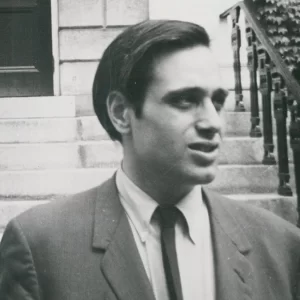He questioned the findings of the Warren Commission, called Edward Snowden a prized Russian asset and exposed the diamond industry’s economic impact.

Edward Jay Epstein in 1966, the year he turned his master’s thesis into a best-selling book on the Kennedy assassination.Credit…Marc Green/Viking Press
Edward Jay Epstein, an iconoclastic author whose deeply researched books challenged conventional wisdom about controversies ranging from whether John F. Kennedy was killed by a lone assassin to whether the whistle-blower Edward Snowden was really a Russian spy, has died in Manhattan. He was 88.
The cause was complications of Covid, his nephew Richard Nessel said. He said Mr. Epstein was found dead in his apartment on Tuesday.
A professional skeptic, Mr. Epstein wrote more than two dozen nonfiction books, many involving allegations of government conspiracies and corporate dereliction. Some raised more questions than they answered.
In an improbable start to a prolific career, he debuted as an author early in 1966 when he transformed his master’s thesis at Cornell University into a book, “Inquest: The Warren Commission and the Establishment of Truth.” The New York Times called it “the first book to throw open to serious question, in the minds of serious people,” the conclusions reached by the presidential panel appointed to investigate President Kennedy’s assassination in Dallas on Nov. 22, 1963.

That very day in 1963, Mr. Epstein had borrowed his stepfather’s car and driven from New York City to the Cornell campus in upstate Ithaca, N.Y., to try to wangle his way back into school after having flunked out seven years earlier.
“The entire campus seemed eerily deserted,” he recalled in his memoir, “Assume Nothing: Encounters With Assassins, Spies, Presidents, and Would-Be Masters of the Universe” (2023), until he encountered a lone student, who informed him of Kennedy’s death.
Thanks to a mentor, the political scientist Andrew Hacker, whose class was one that Mr. Epstein had aced, he was readmitted and encouraged to write his thesis on the assassination. In doing so he gained access to every member of the seven-man Warren Commission except its leader, Chief Justice Earl Warren.
His book raised doubts about the commission’s finding that Kennedy was killed by a lone assassin, basing them largely on what Mr. Epstein considered serious deficiencies in the panel’s investigation. “Inquest” was published a few months before “Rush to Judgment” by Mark Lane, another in a tsunami of books suggesting that the commission had been hampered by time constraints, by limited resources and access, and by Justice Warren’s demand for unanimity to make its conclusions more credible.
